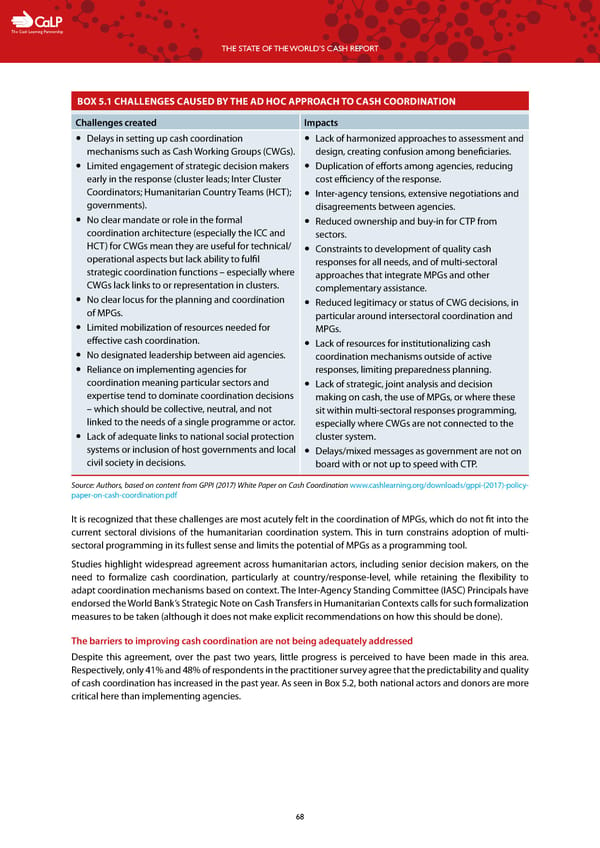C The Cash Learning Partnership THE STATE OF THE WORLD’S CASH REPORT BOX 5.1 CHALLENGES CAUSED BY THE AD HOC APPROACH TO CASH COORDINATION Challenges created Impacts — Delays in setting up cash coordination — Lack of harmonized approaches to assessment and mechanisms such as Cash Working Groups (CWGs). design, creating confusion among beneficiaries. — Limited engagement of strategic decision makers — Duplication of efforts among agencies, reducing early in the response (cluster leads; Inter Cluster cost efficiency of the response. Coordinators; Humanitarian Country Teams (HCT); — Inter-agency tensions, extensive negotiations and governments). disagreements between agencies. — No clear mandate or role in the formal — Reduced ownership and buy-in for CTP from coordination architecture (especially the ICC and sectors. HCT) for CWGs mean they are useful for technical/ — Constraints to development of quality cash operational aspects but lack ability to fulfil responses for all needs, and of multi-sectoral strategic coordination functions – especially where approaches that integrate MPGs and other CWGs lack links to or representation in clusters. complementary assistance. — No clear locus for the planning and coordination — Reduced legitimacy or status of CWG decisions, in of MPGs. particular around intersectoral coordination and — Limited mobilization of resources needed for MPGs. effective cash coordination. — Lack of resources for institutionalizing cash — No designated leadership between aid agencies. coordination mechanisms outside of active — Reliance on implementing agencies for responses, limiting preparedness planning. coordination meaning particular sectors and — Lack of strategic, joint analysis and decision expertise tend to dominate coordination decisions making on cash, the use of MPGs, or where these – which should be collective, neutral, and not sit within multi-sectoral responses programming, linked to the needs of a single programme or actor. especially where CWGs are not connected to the — Lack of adequate links to national social protection cluster system. systems or inclusion of host governments and local — Delays/mixed messages as government are not on civil society in decisions. board with or not up to speed with CTP. Source: Authors, based on content from GPPI (2017) White Paper on Cash Coordination www.cashlearning.org/downloads/gppi-(2017)-policy- paper-on-cash-coordination.pdf It is recognized that these challenges are most acutely felt in the coordination of MPGs, which do not fit into the current sectoral divisions of the humanitarian coordination system. This in turn constrains adoption of multi- sectoral programming in its fullest sense and limits the potential of MPGs as a programming tool. Studies highlight widespread agreement across humanitarian actors, including senior decision makers, on the need to formalize cash coordination, particularly at country/response-level, while retaining the flexibility to adapt coordination mechanisms based on context. The Inter-Agency Standing Committee (IASC) Principals have endorsed the World Bank’s Strategic Note on Cash Transfers in Humanitarian Contexts calls for such formalization measures to be taken (although it does not make explicit recommendations on how this should be done). The barriers to improving cash coordination are not being adequately addressed Despite this agreement, over the past two years, little progress is perceived to have been made in this area. Respectively, only 41% and 48% of respondents in the practitioner survey agree that the predictability and quality of cash coordination has increased in the past year. As seen in Box 5.2, both national actors and donors are more critical here than implementing agencies. 68
 The State of the World's Cash | Full Report Page 69 Page 71
The State of the World's Cash | Full Report Page 69 Page 71